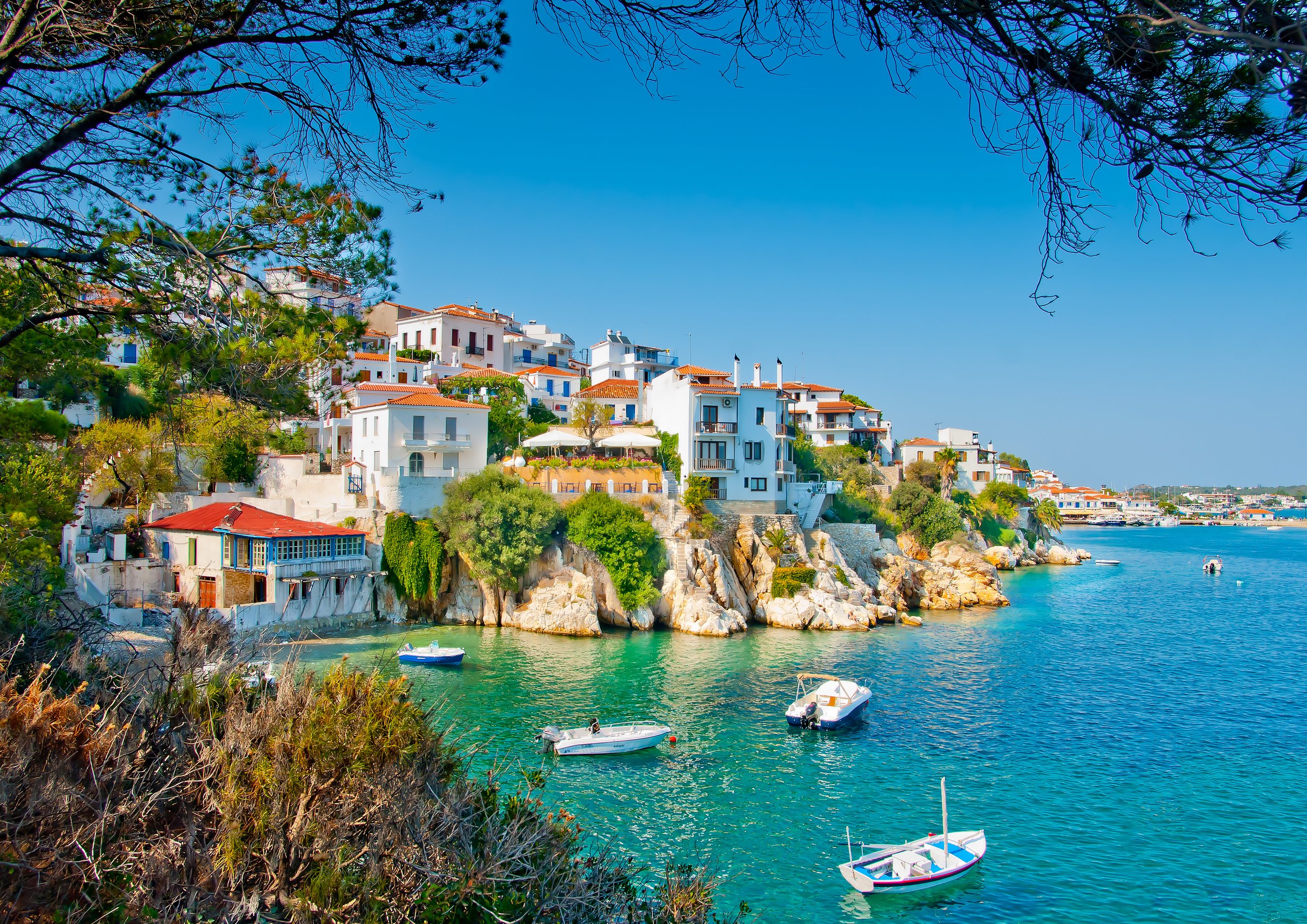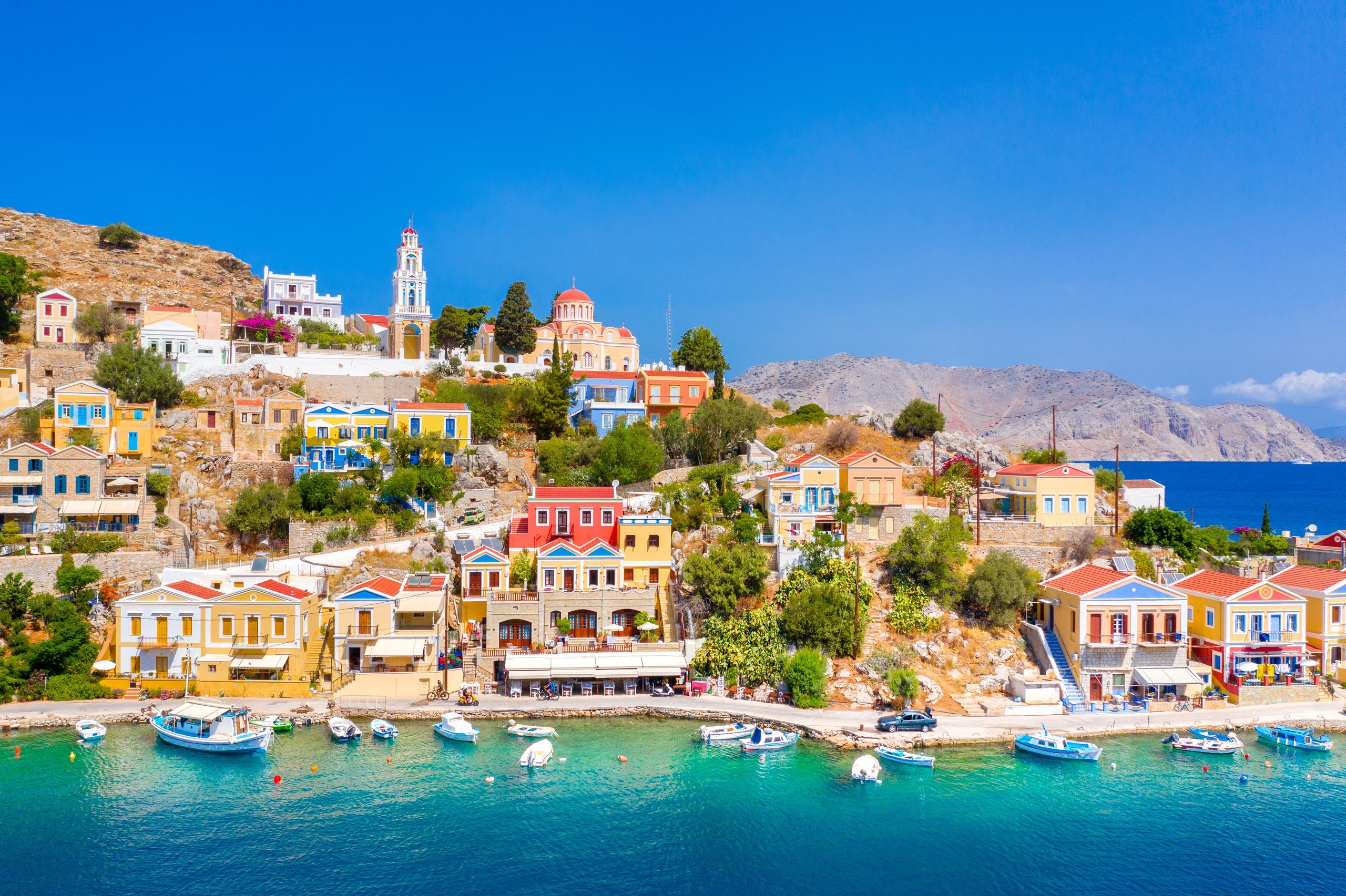With its historic Old Town, golden beaches and affordable property, Rhodes offers the best of Greek island life – without the premium price tag.
Whether you’re dreaming of a laid-back retirement in the sun, searching for a second home for family holidays or eyeing a property with strong rental potential, Rhodes delivers on every front. As one of Greece’s largest and sunniest islands, it combines natural beauty with excellent infrastructure and property prices that are still well below those of better-known hotspots like Crete and Corfu.
Download the Greece Buying Guide
Contents
Why buy property in Rhodes?
Rhodes isn’t just the capital of the Dodecanese – it’s an island full of history, energy and contrast. The Old Town is a UNESCO World Heritage site, with cobbled alleyways, medieval architecture and a maze of lanes leading to hidden courtyards and ancient fountains. The beaches are equally impressive, from the family-friendly golden sands of Tsambika to the windsurfer’s paradise of Prasonisi, where the Aegean and Mediterranean seas meet.
There’s also room to breathe. Rhodes is about 80 kilometres from north to south, with pine forests, vineyards and olive groves inland. Mount Attavyros rises more than 1,200 metres above sea level, and many inland villages remain untouched by tourism.
If you’re looking for a base for year-round living or a short-term rental investment, Rhodes has both the charm and the practicalities. It’s well-connected, has a network of hospitals and clinics, good supermarkets and international schools – so it’s not just a summer bolthole, it’s a real home.
What is the weather like?
With over 3,000 hours of sunshine a year, Rhodes is one of the warmest and driest Greek islands. Summers are long and hot, with average highs of 30°C between June and September and barely a drop of rain. Even October often enjoys highs of 25°C or more, and sea temperatures stay swimmable into November. Winters are mild, with highs of 12°C in January, and the island retains enough local life to keep things interesting even out of season.
What can I get for my budget?

Rhodes has options for all price points – especially if you’re willing to look inland or consider light renovation. Here’s what different budgets typically buy:
| Budget | Typical Property Type | Features |
|---|---|---|
| €150,000 | Village house or small apartment | Often with traditional features, renovation potential |
| €250,000 | Three-bedroom villa or apartment near the coast | Likely to include outdoor space, may have a sea view |
| €400,000+ | Modern villa with garden and pool | Prime locations, high-end finishes, rental appeal |
If you’re after a new build, they’re relatively limited in Rhodes, so Crete or the Athens Riviera may be a better option. Still, new projects do occasionally launch – especially in the hills above Ialyssos.
Is property in Rhodes a good investment?
Rhodes offers excellent value for money, especially compared with Crete or Santorini. As of June 2025, the average price per square metre was €2,146, according to Indomio – well below Crete (€2,053), Corfu (€2,619), and miles cheaper than high-profile islands like Santorini or Mykonos where prices often exceed €4,000/m².
The island also welcomes millions of international tourists. In 2024, Rhodes Airport handled almost 3m international arrivals – making it one of Greece’s busiest holiday destinations outside of Athens and Crete. If you’re thinking about short-term rentals, there’s a well-established market to tap into.
How to get to Rhodes
Rhodes International Airport (Diagoras) connects directly with UK cities as well as Germany, Italy and France. These routes are seasonal, but the season now stretches from March to November, with daily flights to Athens available year-round.
The island is also accessible by ferry, linking Rhodes with Piraeus (Athens), the Dodecanese, the Cyclades and even parts of Turkey.
Where to buy in Rhodes
Rhodes has a mix of lively towns, peaceful villages and resort-style beach zones. Here’s a quick guide to popular areas:
- Rhodes Town: a UNESCO site packed with history and atmosphere. A great option for those who want walkable access to restaurants, shops and cultural life.
- Lindos: known for its sugar-cube houses, rooftop tavernas and iconic Acropolis. Properties often have sea views and good rental potential.
- Ialyssos & Ixia: on the northwest coast, popular with holidaymakers. Offers a mix of modern apartments and villas close to the beach and Rhodes Town.
- Faliraki: a livelier resort area with a long sandy beach. Ideal for buyers looking for strong short-term rental returns.
- Kallithea: known for its thermal springs and beautiful coast. More peaceful than Faliraki but still close to amenities.
- Afandou: a traditional village with a long beach and a golf course. Quieter and more affordable than the main resorts.
How to buy property in Rhodes
Buying in Greece is very achievable – especially when you know the steps.
Here’s how the process typically works:
- Research and plan
Read guides, talk to others who’ve bought in Greece and attend webinars. Try to narrow down your preferred area.
- Set your criteria
Define your non-negotiables and your “nice-to-haves”. Don’t forget to allow around 10% on top of the sale price for buying costs.
- Speak to a currency expert
Exchange rates move daily, so talk to a professional about locking in a rate with a forward contract.
- Get your AFM number
This tax ID number is required for any property transaction. You’ll need your passport and birth certificate to apply at the local tax office.
- Build your team
Contact a local estate agent, an independent lawyer and, if relevant, a tax advisor. Your Overseas Home can help connect you with verified professionals.
- Go on a viewing trip
Let your agent know what you’re after and plan a trip to view properties in person.
- Make an offer
Offers are made via your agent. Your lawyer will begin legal checks and due diligence.
- Reservation and contract
Once terms are agreed, you’ll sign a reservation agreement and pay a deposit (usually 10%).
- Sort your utilities
If your home is ready to go, this is a good time to arrange electricity, water and internet.
- Final signing
You’ll sign the purchase contract at the notary’s office and pay the outstanding amount plus taxes and fees. You’ll then receive the keys.
- Registration
Your lawyer will register the purchase with the Greek Land Registry to finalise ownership.
Frequently asked questions
The buying process in Rhodes follows the standard steps for Greece. You’ll need to obtain a Greek tax number (AFM), appoint an independent lawyer and make sure due diligence checks are completed before signing the final contract at the notary’s office. Allow around 10% extra for taxes and fees on top of the agreed sale price.
Yes. Rhodes offers strong rental demand thanks to its popularity with international tourists – almost 3m arrivals passed through Rhodes Airport in 2024. Average property prices remain below those of Santorini and Mykonos, giving buyers both better value and good prospects for capital growth.
Many buyers are drawn to Lindos, with its whitewashed houses, rooftop tavernas and the famous Acropolis overlooking the bay. For a quieter, more traditional setting, Afandou and Embonas offer local life and better affordability.
You might also like:









